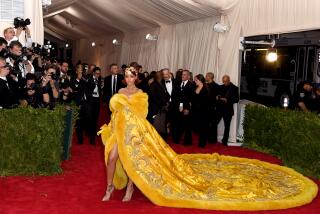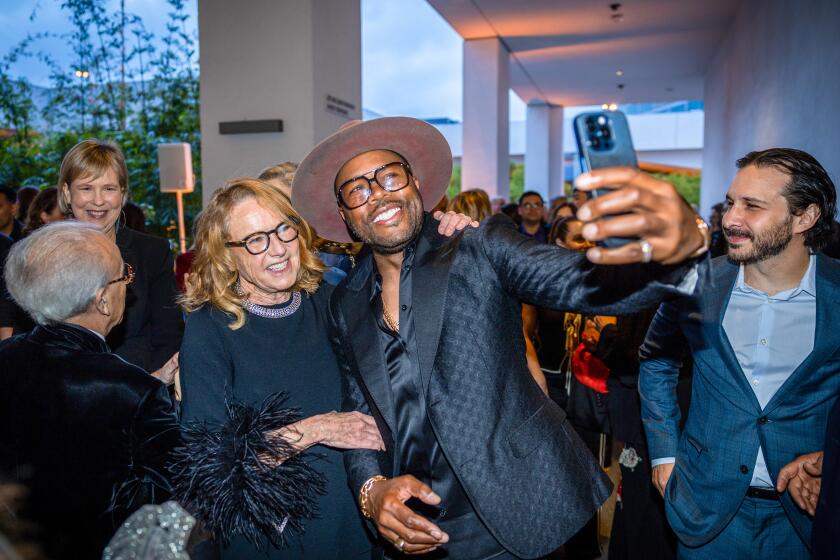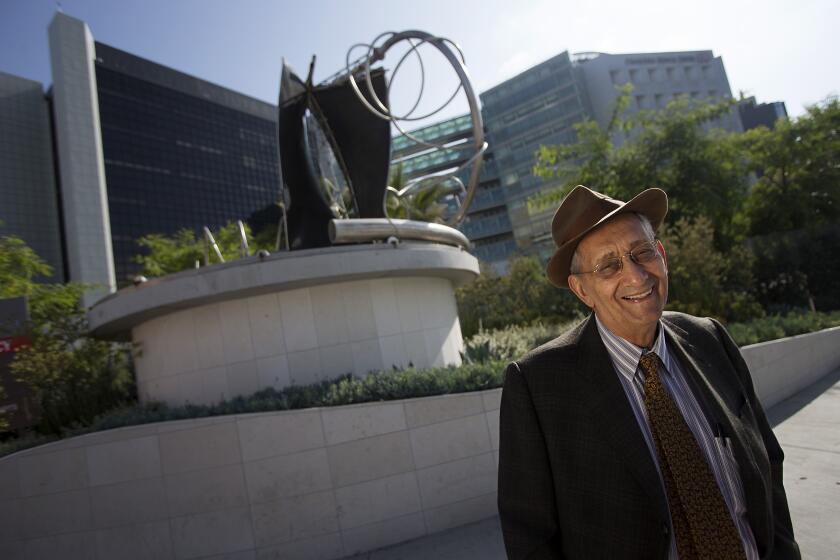MUSIC : Munich, Bayreuth and Salzburg: Some Afterthoughts
Operas of Richard Strauss in Munich, with Kander and Ebb’s “Cabaret” and Janacek’s “Makropulos Affair” as incidental diversions. Operas of Richard Wagner in Bayreuth, with the focus on Harry Kupfer’s bizarre new production of the mighty “Ring.” Operas of Mozart in Salzburg, with a “Salieri and Amadeus” exhibit in the house of his birth for commercial punctuation and a little Pavarotti and Rossini for distraction.
Twenty-four performances in 27 days. Expectations high. Ditto disappointments.
Time for cultural digestion, or, as the case may be, indigestion. Time for reflection. . . .
Munich isn’t like Bayreuth and Salzburg. As far as fellow travelers of the musical persuasion are concerned, there is life in Munich beyond the festival.
Munich plays opera all year long, in three theaters. That is true, of course, only when the stage machinery happens to be in order. When the festival ended July 31, the great National Theater had to close its doors for seven months of painful and embarrassing technical renovation.
Life will go on, however, at the exquisite Cuvillies-Theater, a rococo wonder appropriate for operatic intimacy. Life also will go on at the popular Staatstheater am Gartnerplatz, which houses everything from opera to operetta to musical comedy.
The Gartnerplatz production of “Cabaret” is enormously successful with the local masses. Still, for anyone familiar with the Broadway original, it loses a good deal in translation.
Although a few songs and bits of dialogue are offered in the original English, this ironic study of prewar Berlin has been drastically re-focused and re-Germanified. Bald references to Hitler & Co. crop up early in the first act. Decadence reigns and destruction looms from the start.
Wolfgang Reichmann as a burly, nasty, baldpated Master of Ceremonies at the Kit Kat Klub wants none of Joel Grey’s whimsy. Gaye MacFarlane overplays Sally Bowles as if she were a misplaced Ethel Merman. Helmut Baumann’s staging is, to say it lightly, heavy handed.
Nevertheless, a good time is had by some.
Mozart Kugeln may be a popular confection in Salzburg, but no candy store in Munich carries chocolate-covered odes to Richard Strauss. In a Bayreuth confiserie , one can buy a bust of Wagner sculpted in marzipan. It looks much like his death mask, on display nearby in the Wahnfried museum. But Munich reveres the memory of its favorite musical son only in musical ways.
The most important way this summer was to present all 15 operas of Richard Strauss in a single, unprecedented series. Even so, Munich indulged in some cheating.
Concert performances were considered adequate for “Guntram,” an ancient and unwieldy exercise in hyper-Wagnerism, and for “Friedenstag,” an ambiguous paean to peace in the dubious Germanic tones of 1938. At a press conference, Wolfgang Sawallisch fervently defended the bombastic score as well as the simplistic dramaturgy of “Friedenstag.” Under the circumstances, one had to wonder why the opera wasn’t considered stage-worthy.
In Munich, everyone second-guesses artistic decisions. Even Richard Strauss’ daughter-in-law, Alice, contributed some criticism. Interviewed at the family villa in Garmisch, the feisty 84-year-old said, “It would have been better to stage ‘Guntram’ and give ‘Danae’ in concert form.”
This was an unveiled attack on a parodistic production of “Die Liebe der Danae” staged by Giancarlo del Monaco (son of the late tenor Mario del Monaco) and designed by Monika von Zallinger. Frau Strauss went on to bemoan “the horrible set and one of those young directors who always have to do things any way but the way dictated by the text.”
Alice Strauss would not have approved of Harry Kupfer’s Bayreuth “Ring.” Kupfer is another one of those directors.
He has lots of fascinating ideas. He has a healthy disrespect for the distant past, a healthy respect for the present and, perhaps, the future. The high-tech images of his politically oriented “Ring” occasionally quote Patrice Chereau while evoking the theatrical realism of Walter Felsenstein.
Still, Kupfer meddles. He invents action unsanctioned by the libretto and, more dangerous, brings characters on even when Wagner wanted them off stage. In the process, he impugns melodic integrity. If Wagner had intended Wotan to reappear during Siegfried’s encounter with the wood bird or at the climax of Siegfried’s funeral march, Wagner would have quoted Wotan’s motives at these crucial moments.
We know. We know. Nothing need be sacred. All’s fair in love and opera. The composer himself urged his followers to be creative and original. But. . . .
If the ceaseless innovators can rewrite the libretto, they ought to do so in conjunction with a comparably rewritten score. Let’s go all the way. Then at least and at last we could have logic and unity.
Then we really would have a new “Ring.”
Sign of the times: The central prop and pervasive symbol of power in the “Ring” is the golden ring itself. But Kupfer doesn’t put a ring on his characters’ fingers. Instead, he provides something heavier, more ominous, more dangerous: gold knuckles.
Friedelind Wagner, the composer’s grand-daughter, was again conspicuously absent from the festival. The perpetual black sheep of the family has, it seems, been black-listed by her brother, Wolfgang, who calls the artistic shots on the green hill.
One day between performances, however, she did return to visit with friends at a cafe near the Festspielhaus.
She offered some enlightened, disparaging remarks about what she had been reading and about what she had been hearing in broadcasts. She also volunteered a characteristic appraisal of current festival trends.
“Bayreuth,” she muttered with a devastating smile, “is no place for a Wagner.”
Kupfer hails from East Germany, works primarily in East Berlin. This gives one pause to ponder. Has his socialist orientation influenced his interpretation of Wagner’s mythology?
In this “Ring,” it is impossible to distinguish between the sub-humans, the mortals, the supermen and the gods. Class distinctions have become meaningless.
That is nice, comforting, reassuring on a humanistic level. Too bad it is so emphatically contradicted by text and score. Too bad it is irrelevant in the broadest context of Wagner’s music-drama.
Kupfer’s “Ring is all about running. No one stands still when he or she could dart, lope, race, sprint, bound, charge or gallop. While the singers--a generally lightweight lot--may not have produced the most powerful or most voluptuous sounds in Wagnerian history, they certainly could move.
With this in mind, one eagerly awaited the one moment when Wagner actually asked for running. At the end of “Siegfried,” Act II, the hero is supposed to make a dashing exit from the forest, following aviary instructions in quest of the sleeping Brunnhilde
And what happened? The athletic protagonist--a tenor appropriately named Siegfried Jerusalem--smiled, looked up at a stuffed tweety bird on a string and strolled off stage.
He couldn’t run. The ultra-mod set, possibly the cross-section of a network of decaying sewers, gave him nowhere to go.
Oh, the irony of it all.
Another irony: Several key roles--several too many--within this “Ring” were shared by two singers. The young Siegfried, for instance, was sung (with unpredictable triumph) by Jerusalem, but he abandoned the challenge to Reiner Goldberg when it came to “Gotterdammerung.” Therein lies a tale.
Goldberg had been scheduled to sing both Siegfrieds in the previous Bayreuth “Ring,” the misbegotten back-to-nature version staged by Sir Peter Hall and conducted by Sir Georg Solti in 1983. Early on, various informed observers described the East German as a wonder, a genuine Heldentenor, the closest we can get these days to Lauritz Melchioir. Unfortunately, something went wrong.
Goldberg fell victim to nerves. As a result, Solti and Hall got increasingly nervous. First he was withdrawn from “Siegfried,” then, at the last moment, from “Gotterdammerung.” He left Bayreuth in quasi-disgrace.
In 1988, Goldberg had at least the one role securely under his belt (in Bayreuth, Siegfried wears a grease-monkey’s uniform, not a bear skin). His voice, however, sounded pressed, shrill, worn. His acting was rudimentary. He didn’t even run well.
Perhaps it was those nerves again. Perhaps it was a case of too much, too late.
Most Wagnerians agree that the most reliable Heldentenor of the day is Rene Kollo, who sang Siegfried in the San Francisco “Ring” of 1984. Outspoken, somewhat temperamental, and prone to cancelling, Kollo has been conspicuously absent from Bayreuth casts for some time. This summer, he did return long enough to attend some rehearsals and prepare a Lied recital at the lovely little Baroque opera house downtown.
After one of the rehearsals, he caused something of a stir when he told an interviewer that there were too many foreigners in this “Ring.” They didn’t always know what the text meant, he complained. Perhaps he was referring to the black-voiced but blank Hagen of a young basso from South Korea.
The director of the festival, in any case, was not amused. With outrage and indignation, Wagner’s grandson denied the nasty allegation. Kollo’s recital, which was to have taken place on the free night between “Walkure” and “Siegfried,” was canceled. That must have been a coincidence.
If Kollo functioned as official indiscreet trouble-maker in Bayreuth, Friedrich Gulda played the same role in Salzburg. He played it to the hilt.
Although Gulda is immensely popular hereabouts, he has always caused problems for the conservatives. The Salzburg management is very conservative.
For starters, Gulda doesn’t like to be pigeon-holed as an artist. At 58, he is still an enfant terrible . He plays the piano. He conducts. He composes. He talks. He plays the flute and the baritone saxophone. He crosses over into jazz. He improvises. All that makes the Establishment uncomfortable.
He also doesn’t like festival snobbery. That makes the Establishment angry.
This summer, Gulda was permitted to preside over a special alfresco concert in front of the mighty Salzburg cathedral. He managed to turn this event into a delirious folk fest, even though it lacked the sanction of Saint Herbert of Karajan and other local deities.
The powers-that-were, we learn, barely grudged approval for Gulda. The classical romanticists were even less happy about the participation of a jazz virtuoso, Joe Zawinul, and an authentic old-music specialist, Nikolaus Harnoncourt.
Gulda was offended. He tends to get offended easily, and often.
He canceled all his hard-won Salzburg commitments, including a piano-concerto performance, a recital, and, perhaps most important, a multifaceted evening with “Gulda and Friends.” Heinrich Schiff, who had been scheduled to play Gulda’s cello concerto with the London Symphony Orchestra, decided to substitute Haydn.
Controversy raged in the local press. Tongues wagged at intermissions. Heated debates threatened to collapse many a Salzburger Nockerl at mealtime. This festival may not like musical iconoclasts, but it certainly enjoys a little Skandal .
Gulda left rainy Salzburg for friendlier climes. He may, or may not, have had the last word in a letter to the festival management that just happened to find its way into a local newspaper.
This presumably was the key passage:
“In every respect, the pretty girls of the Cote d’Azur or Ibiza are more appealing to me than the Salzburg Festival, and, thanks to disco dancing, the girls offer greater musical stimulation. At this time, my delight in and with these girls promises to be especially exquisite, since--in the best Epicurean sense--it combines sensuous pleasure with moral rectitude.”
Meanwhile, Luciano Pavarotti waved his white tablecloth to his rich, adoring fans in the Festspielhaus and, via closed-circuit television, to his less rich, equally adoring fans in the Domplatz. Karajan--old, frail and seemingly uninvolved--was busy polishing his somnolent, old-fashioned, automatically applauded “Don Giovanni.”
And the old Salzach River just kept rolling along.
More to Read
The biggest entertainment stories
Get our big stories about Hollywood, film, television, music, arts, culture and more right in your inbox as soon as they publish.
You may occasionally receive promotional content from the Los Angeles Times.






